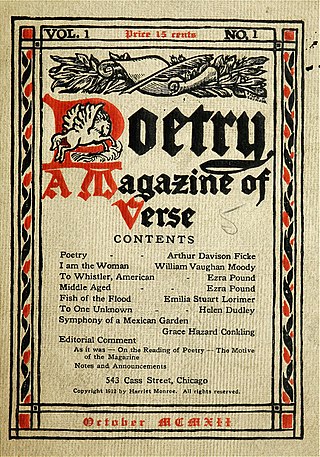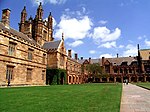Related Research Articles

The Bulletin was an Australian weekly magazine based in Sydney and first published in 1880. It featured politics, business, poetry, fiction and humour, alongside cartoons and other illustrations.

Australian literature is the written or literary work produced in the area or by the people of the Commonwealth of Australia and its preceding colonies. During its early Western history, Australia was a collection of British colonies; as such, its recognised literary tradition begins with and is linked to the broader tradition of English literature. However, the narrative art of Australian writers has, since 1788, introduced the character of a new continent into literature—exploring such themes as Aboriginality, mateship, egalitarianism, democracy, national identity, migration, Australia's unique location and geography, the complexities of urban living, and "the beauty and the terror" of life in the Australian bush.

A literary magazine is a periodical devoted to literature in a broad sense. Literary magazines usually publish short stories, poetry, and essays, along with literary criticism, book reviews, biographical profiles of authors, interviews and letters. Literary magazines are often called literary journals, or little magazines, terms intended to contrast them with larger, commercial magazines.
Carmelina Marchetta is an Australian writer and teacher. Marchetta is best known as the author of teen novels, Looking for Alibrandi, Saving Francesca and On the Jellicoe Road. She has twice been awarded the CBCA Children's Book of the Year Award: Older Readers, in 1993 and 2004. For Jellicoe Road she won the 2009 Michael L. Printz Award from the American Library Association, recognizing the year's best book for young adults.
David Gordon Brooks is an Australian poet, novelist, short-fiction writer and essayist. He is the author of four published novels, four collections of short stories and five collections of poetry, and his work has won or been shortlisted for major prizes. Brooks is a highly intellectual writer, and his fiction has drawn frequent comparison with the writers Italo Calvino and Jorge Luis Borges.
This article presents a list of the historical events and publications of Australian literature during 2007.
This article presents a list of the historical events and publications of Australian literature during 2006.
This article presents a list of the historical events and publications of Australian literature during 2008.
Debra Adelaide is an Australian novelist, writer and academic. She teaches creative writing at the University of Technology Sydney.
AustLit: The Australian Literature Resource is a national bio-bibliographical database of Australian literature. It is an internet-based, non-profit collaboration between researchers and librarians from Australian universities, housed at The University of Queensland (UQ). The AustLit database comprises biographical and bibliographical records of Australian storytelling and print cultures, with over 1 million individual 'work' records, and over 75 discrete research projects.
John Jenkins is an Australian poet, non-fiction author and editor.> He is the author, co-author, editor or co-editor of many books, mostly poetry and non-fiction.

John Foulcher is an Australian poet and teacher.
This article presents a list of the historical events and publications of Australian literature during 2011.
This article presents a list of the historical events and publications of Australian literature during 1939.

The Australian Magazine, or, Compendium of Religion, Literary, and Miscellaneous Intelligence was the first periodical produced in Australia. It was a short-lived publication. In later years there were a number of other unrelated periodicals that were also called The Australian Magazine.
This article presents a list of the historical events and publications of Australian literature during 1986.
This article presents a list of the historical events and publications of Australian literature during 1988.
This article presents a list of the historical events and publications of Australian literature during 1998.
Elaine Stuart Lindsay is an Australian academic whose work has focussed on literature and feminist theology. She was instrumental in the development of the Women-Church journal which provided publishing opportunities in feminist theology for Australian women.
References
- 1 2 3 Australian government culture and recreation portal Archived 2010-12-08 at the Wayback Machine
- 1 2 3 Southerly home page Archived 2010-03-10 at the Wayback Machine
- ↑ The Long Paddock
- ↑ "About Southerly". Southerly. Archived from the original on 28 October 2016. Retrieved 28 October 2016.
- 1 2 Southerly index page Archived 2009-10-13 at the Wayback Machine
- ↑ "Austlit – Southerly periodical". Austlit. Retrieved 16 January 2025.
- ↑ "About us". Southerly. 8 March 2019. Retrieved 5 June 2019.
Sources
- Carter, David, "Magazine Culture: Notes Towards a History of Australian Periodical Publication 1920-1970", in Bartlett, Dixon & Lee (eds) 1999, Australian Literature and the Public Sphere, ASAL, Toowoomba, pp. 69–79.
- Green, H M. (1962) A History of Australian Literature, Vol I 1789-1923, Angus & Robertson, Sydney.
- Greenop, Frank. (1947) History of Magazine Publishing in Australia, K.G. Murray Publishing Company, Sydney.
- Tregenza, John. (1964) Australian Little Magazines 1923-1954: Their Role in Forming and Reflecting Literary Trends, Libraries Board of South Australia, Adelaide.
